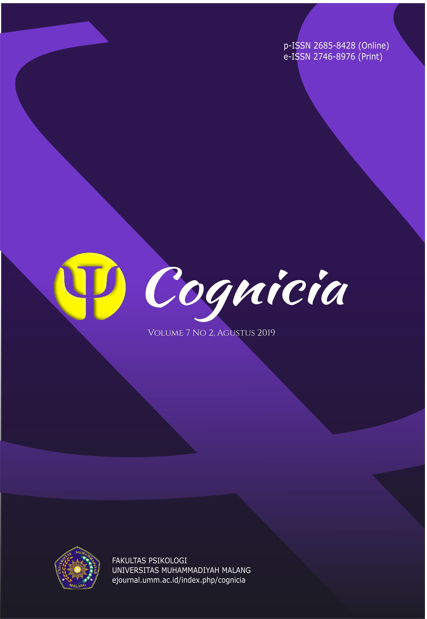Kontrol diri dengan tingkat agresivitas remaja yang memiliki orang tua TNI atau POLRI
DOI:
https://doi.org/10.22219/cognicia.v7i2.9251Keywords:
Self-Control, Aggressive BehaviorAbstract
Aggressive behavior in adolescents can be minimized and reduced by using self-control. Self-control is needed for every individual, especially adolescents. Age and family’s environment are the factors that underlie a person can control himself. The aims of this research are to knowing the relationship between self-control and the level of aggressiveness in adolescents who have TNI or POLRI parents. This research using quantitative correlational approarch with the data collections using quota sampling technique, the subjects of this research were aged 13 until 17 years old who have TNI or POLRI parents. The instrument of this research using self control scale from Tangney, Baumeister, and Boone theory, and also using aggressive scale from Baron. The results of this study showed that there was a significant negative relationship between self-control and the level of aggressiveness in adolescents who have TNI or POLRI parents. It means, the increasing of self-control possessed by adolescents, the level of aggressiveness will be decreases, in another hand the decreasing of self-control that teenager has, the level of aggressiveness will be increases.Downloads
References
Aroma, I. S., & Suminar, D. R. (2012). Hubungan antara tingkat kontrol diri dengan kecenderungan perilaku kenakalan remaja. Journal Psikologi Pendidikan dan Perkembangan Vol. 1(2), 5-6.
Antasari. (2006). Menyikapi perilaku agresif anak. Yogyakarta: Kanisius.
Averill, J. R. (1983). Studies on anger and aggression: Implications for theories of emotion. American Psychologist, 38, 1145–1160.
Baron, R.A, & B. D. (1994). Social psychology: Understanding human interaction. Boston: allyn & Bacon, Inc.
Baumeister, R. F., Vohs, K. D., dan Tice, D. M. 2007. The Strength Model of Self-Control. Association for Psychological Science Vol. 16(6), 351-355.
Benjamin, A. J. (2015). Aggression. Encyclopedia of mental health: Second Edition, 1, 33–39. https://doi.org/10.1016/B978-0-12-397045-9.00198-1
Brookings, J. B., DeRoo, H., & Grimone, J. (2008). Predicting driving anger from trait aggression and self-control. Psychological Reports, 103, 622-624.
Calhoun, J.F & Acocella, J.R. (1995). Psikologi tentang penyesuaian dan hubungan kemanusiaan. Semarang: IKIP Semarang Press.
Chaplin, J. P. (2001). Kamus lengkap psikologi. Jakarta: Raja Grafindo Perkasa.
DeWall, C. N., Finkel, E.J. & Denson, T. F.(2011). Self-control inhibits aggression. Social
and personality psychology compass. 5(7), 458-472.
Emilianur, E., & Amri, A. (2017). POLA PENGASUHAN ANAK PADA KELUARGA MILITER (Suatu Penelitian di Asmil Kompi Panser 11.1 Lhoknga, Yonkav 11/Serbu Aceh Besar). Jurnal Ilmiah Mahasiswa Fakultas Ilmu Sosial & Ilmu Politik, 2(4).
Ghufron. (2010). Teori-teori perkembangan. Bandung: Refika Aditama.
Goldfried, M. R., & Merbaum, M (1973). Behavior change through self-control. New York: Holt, Rinehart & Winston.
Havighurst, R.J., Neugarten, B.L. & Tobin, S. S. (1964). Disengagement personality and life satisfaction in the later years. Copenhagen: Munksgaard.
Hudaniah, T. D. &. (2012). Psikologi sosial. Malang: UMM Press.
Hurlock. (2004). Psikologi perkembangan suatu pendekatan sepanjang rentang kehidupan. Jakarta : Erlangga.
Johnson, R.J., & Meddinus, G.R. (1976). Child and Adolescence Psychology. New York: John Wiley and Sons, Inc.
Krahe, B. (2001). The social psychology of aggression. East Sussex: Psychology Press
Koeswara, E. (1988). Agresi manusia. Bandung: PT Eresco.
Monks, F.J., Knoers, A.M.P., Haditono, S. R. (2006). Psikologi perkembangan: Pengantar dalam berbagai bagiannya. Yogyakarta: Gadjah Mada University Press.
Murray, R. K., Granner, D. K., & Rodwell, V. W (2009) . Biokimia harper (27 ed.). Jakarta: Buku Kedokteran EGC;
Myers, David G. (2012). Psikologi sosial jilid 2. Jakarta: Salemba Humanika.
Praditya, L. D., Wimbarti, S., & Helmi, A., F. (1999). Pengaruh tayangan adegan kekerasan yang nyata terhadap agresivitas. Jurnal psikologi, Vol 1(1), 1-12.
Purwanto. (2015). Metodologi penelitian kuantitatif untuk psikologi dan pendidikan. (B. Santoso, Ed.). Yogyakarta: Pustaka Belajar.
Rosmha Widiyani. (2014). Kasus Ade Sara, Dampak Salah Asuh Orangtua?. Kompas.com.
https://lifestyle.kompas.com/read/2014/03/10/1455563/Kasus.Ade.Sara.Dampak.Salah.Asuh.Orangtua.
Schneider, Kerri M. (2005). Aggression and Cardivascular Response in Children. Journal Of Pediatric Psychology, Vol. 27(7), 565-573.
Soekanto, S. (1988). Sosiologi penyimpangan. Jakarta: Radjawali.
Susanto, D. (2013). Keterlibatan ayah dalam pengasuhan, kemampuan coping dan resiliensi remaja. Jurnal Sains Dan Praktik Psikologi Magister Psikologi UMM, 1 (2), 101 – 113.
Tangney, J.P., Baumeister R. F., & Boone, A. L. (2004). High self-control predicts good adjusment, less psychology, better grades, and interpersonal succes. Journal Of Personality 72:2 Blackwell Publishing.
Ubaidillah, M. A. (2017). Hubungan kontrol diri dengan agresivitas santri baru pondok pesantren ilmu Al-Qur’an Singosari Malang, (12410143).
Downloads
Published
How to Cite
Issue
Section
License
Copyright (c) 2019 Ansih Mahliyatul Khoir

This work is licensed under a Creative Commons Attribution-ShareAlike 4.0 International License.
Authors who publish with Jurnal Cognicia agree to the following terms:
- For all articles published in Jurnal Cognicia, copyright is retained by the authors. Authors give permission to the publisher to announce the work with conditions. When the manuscript is accepted for publication, the authors agree to automatic transfer of the publishing right to the publisher.
- Authors retain copyright and grant the journal right of first publication with the work simultaneously licensed under a Creative Commons Attribution-ShareAlike 4.0 International License that allows others to share the work with an acknowledgment of the work's authorship and initial publication in this journal.
- Authors are able to enter into separate, additional contractual arrangements for the non-exclusive distribution of the journal's published version of the work (e.g., post it to an institutional repository or publish it in a book), with an acknowledgment of its initial publication in this journal.
- Authors are permitted and encouraged to post their work online (e.g., in institutional repositories or on their website) prior to and during the submission process, as it can lead to productive exchanges, as well as earlier and greater citation of published wor (See The Effect of Open Access).

This work is licensed under a Creative Commons Attribution-ShareAlike 4.0 International License







